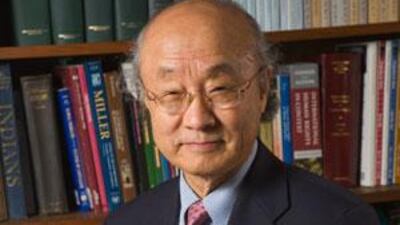BEIJING // The US will "drastically" change its hardline policy towards North Korea to engage the Stalinist country directly, despite a string of recent disputes, an American scholar who recently returned from Pyongyang said. "I don't think we have seen the true Obama doctrine policy on North Korea up to now. But it's coming now," Han S Park, a professor of political science at the University of Georgia, said in an interview.
As a presidential candidate, Mr Obama said he would sit down with enemy states unconditionally, including North Korea, to resolve differences. However, up until now, this so-called "Obama doctrine" has not manifested itself. The two nations' relationship has actually deteriorated since the inauguration of the Obama administration. North Korea angered the US, as well as South Korea, Japan and China, when it fired off a long-range missile in April and then tested a nuclear weapon in May. The US responded by conducting joint military operations with South Korea and mobilising the international community to impose further sanctions on the isolated nation.
The tension between the two was highlighted last week in Thailand at the Asean Regional Forum, East Asia's top security summit, when the US secretary of state, Hillary Clinton, said North Korea was behaving like an "unruly child". North Korea retorted, calling her "vulgar, unintelligent". Despite the widely watched verbal sparring, Mr Park said the "grand scheme" of reconciliation between the two enemies is quietly beginning to take shape.
The US, he said, will drop the condition that the North must give up its nuclear programme before talks can be held. "The Obama administration will rather drastically shift to offer unconditional bilateral negotiations [with North Korea]," Mr Park said. Mr Park, a frequent visitor to the reclusive North Korea for the last 30 years, has featured prominently in the media since he returned from Pyongyang this month saying the North is willing to release the two detained American journalists, Laura Ling and Euna Lee, if the US offers a formal apology.
Mr Park denied speculation that he had become an interlocutor for the US government, but said, "I am quite optimistic about the prospect of the bilateral channel". While North Korea's domestic conditions - particularly the grave illness of the country's leader, Kim Jong Il - have often been cited as preventing it from reaching out, Mr Park said the Obama administration has also been subject to uncertainties that have kept it from approaching North Korea.
"There have been some disagreements within the administration, you might say. Obama and Clinton have been rivals and their rivalry has not ended," Mr Park said, characterising Mr Obama's appointment of Mrs Clinton as the secretary of state as a "marriage of convenience, not a marriage of policy principles". Mr Park said Mr Obama, who has been preoccupied with other matters domestic and foreign, is slowly gearing up to show his true policy posture on North Korea. "Now the Obama administration is trying to inject different principles into its North Korean policy, more specifically, unconditional bilateral talks," he said.
"The last thing the Obama administration wants to hear is that they are not any different from the Bush administration. They want to show that they are different from the Bush administration." Washington's plan of holding two-party talks with Pyongyang will not come at the expense of scrapping the current six-party talks platform, Mr Park said, though he added that North Korea is not likely to return to the multilateral talks in any case, because it sees it as having exhausted its agenda.
In a landmark deal on Feb 13 2007, North Korea announced that it would shut down its nuclear facility in return for economic aid from the international community. The two countries also agreed to work towards normalisation of relations. Both the US and North Korea have since blamed the other for the talks falling through. Yesterday, North Korea's UN ambassador, Sin Son Ho, reaffirmed at the North Korean mission in New York that his government would not return to the six-party talks. Yet he said Pyongyang "is not against any negotiations with the US".
Analysts believe the possibility of the two countries' bilateral talks will have a more concrete appearance when North Korea ends its "150-Day Battle", a propaganda campaign Pyongyang launched to unify its people. "That ends on September 15," said Yoo Ho-yeol, a North Korea expert at Korea University in Seoul. "Then, North Korea will find a good excuse for a compromise with the US." "A big deal is possible. The Obama administration is an opportunity for North Korea," said Dong Young-seung, the head of the North Korea Security Team at the Samsung Economic Research Institute in Seoul.
However, Mr Dong, of the Samsung Institute, was less optimistic. "North Korea has a system that is problematic," he said. "It doesn't want to believe the offer."
slee@thenational.ae

Bilateral talks between US and Pyongyang 'coming now'
An academic believes the US will significantly soften its hardline stance, adopting instead a doctrine of unconditional engagement with North Korea.
Most popular today
